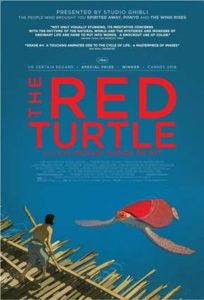Directed By: Michael Dudok de Wit
Rated: PG
Running Time: 80 minutes
Sony Pictures Classic
Our Score: 4 out of 5 Stars
Since 2013, Studio Ghibli has been without Hayao Miyazaki. The creatively diverse, ever-promising studio has seemingly been stuck in a holding pattern. When a found is no longer present, it’s understandable for a production studio to shuffle its feet while trying to find some new footing. Ghibli’s first theatrical step since Miyazaki’s departure may have come in the form of a multi-national collaboration.
“The Red Turtle” isn’t really a story, more than it’s a visual journey. In many ways, it’s a fable without dialogue, taking viewers on a curious excursion. The movie begins with an unnamed man, clinging to life in a furious sea storm. He awakens, stranded on an island that has the most basic of essentials; a small cluster of ponds to drink fresh water from, various fruits to quell his hunger, and bamboo to craft a getaway raft. The only thing preventing his escape is an expressionless red turtle.
Someone with rudimentary observational skills would view “The Red Turtle” as simplistic storytelling without purpose. But the removal of dialogue requires the viewer to take in more than they normally would. You pay more attention to the thinly drawn facial expression changes, the grunts, the various orchestral selections and the nameless man’s dreams that spill into reality. I can tell you what “The Red Turtle” means to me, but this is multi-layered movie that relays a different message for those willing to watch.
I viewed the “The Red Turtle” as a thoughtful reflection about mankind’s need to reconnect with nature in a meaningful way, less we want to wind up alone on this floating blue ball called Earth. It’s not necessarily an environmental message that I took away, but one of humanity’s casual disrespect. We merely take what we need and seem frustrated when nature responds, not with violence, but with curiosity about why we don’t stop in breathe it all in. Once the nameless man works with nature, instead of against it, he begins to be happy and see the island as a miniature slice of heaven.
But like I said, others will take away a much different and distinct opinion from the subtext. This kind of opinion is true for most films, but “The Red Turtle” is crafted in such a way that if there is a true message to be consumed, it’s cleverly hidden beneath a lot of optical substance. Without giving too much away, there are deep themes about family dynamics, the destructive habits that nature and mankind reciprocally share, the mutual survivalism every creature on Earth is enduring, and that’s just a few.
While “The Red Turtle” is a metaphorical delight, it’s pace sometimes is slower than a casual stroll, seemingly padding it’s runtime so it could be considered a feature length film. This is a story that may have benefitted from a shorter runtime, but then again it may have lacked a lot of philosophical richness that viewers would be able to sink their teeth into. “The Red Turtle” is not only a stellar animation endeavor, but a soothing delight that reflects the human soul.


